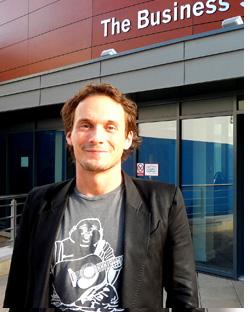Innocent at large
Wed, 02 Nov 2011 15:13:00 GMT
 ONE of Britain’s most irreverent and unorthodox entrepreneurs drew a packed audience of University of Huddersfield business students and their teachers when he spoke about his career – the good times and the bad times.
ONE of Britain’s most irreverent and unorthodox entrepreneurs drew a packed audience of University of Huddersfield business students and their teachers when he spoke about his career – the good times and the bad times.
Yorkshire-born Richard Reed (pictured), educated at Batley Grammar School, is a co-founder of innocent smoothies, consistently voted the UK’s best soft drink. Last year, Richard was awarded an Honorary Doctorate by the University of Huddersfield. Now he was back, to talk about his unusual career trajectory and to field a succession of questions from budding entrepreneurs hoping to follow in his footsteps.
Wearing tee shirt, jeans and trainers, he gave a talk entitled ‘Smart Calls and Screw Ups – Things we’ve learned’. He described the unusual business culture at “Fruit Towers” – London HQ of innocent – and outlined the origins of the company, founded by a group of pals at Cambridge University who had made a pact that they would go into business together one day.
After a false start trying to design and market a potentially deadly electric bath, they hit on the idea of healthy, fruit-based drinks and in 1999, after some unconventional market testing at rock festivals, they began to build a business that soon had a massive turnover and which sells its products in 13 countries.
There was a major setback in 2008, when over-rapid expansion meant the firm risked breaching its banking covenants. The result was that the Coca-Cola took a massive stake in innocent, leading to controversy when critics complained that the firm, noted for its idealism, had sold out to a multi-national. In fact, the Coca-Cola tie-in had worked out fine, according to Richard Reed. innocent had remained free to pursue its own business path.
He told the large audience of students that entrepreneurship had been “the single most life enhancing, mind-expanding thing I have done.”
And he outlined a series of business mantras, such as the importance of having a clear sense of purpose and recruiting the right colleagues – “We look for people that think like entrepreneurs. We try to find the make-it-happen people” – he explained.
He also described the ethical and environmental dimensions to the innocent business and a number of unconventional methods of marketing and research.
Richard Reed’s brains were picked by a succession of students aiming to go down the entrepreneurial route. And since his own business was launched by a group of student friends, he said: “There is a very good chance that the people sitting to your right or left will be the ones you start your own business with.”







